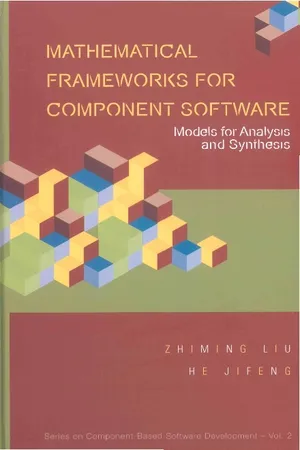
Mathematical Frameworks For Component Software: Models For Analysis And Synthesis
Models for Analysis and Synthesis
- 368 pages
- English
- PDF
- Available on iOS & Android
Mathematical Frameworks For Component Software: Models For Analysis And Synthesis
Models for Analysis and Synthesis
About this book
The range of components technology is both wide and diverse, but some common understanding is emerging through the ideas of model-based development. These include the notions of interfaces, contracts, services, connectors and architectures. Key issues in the application of the technology are becoming clearer, including the consistent integration of different views of a component, component composition, component coordination and transformation for platforms. However, we still know little about theories that support analysis and synthesis of component-based systems. The distinct feature of this volume is its focus on mathematical models that identify the "core" concepts as first class modeling elements, and its providing of techniques for integrating and relating them. The volume contains eleven chapters by well-established researchers writing from different perspectives. Each chapter gives explicit definitions of components in terms of a set of key aspects and addresses some of the problems of integration and analysis of various views: component specification, component composition, component coordination, refinement and substitution, and techniques for solving problems. The concepts and techniques are motivated and explained with the help of examples and case studies.
Tools to learn more effectively

Saving Books

Keyword Search

Annotating Text

Listen to it instead
Information
Table of contents
- Contents
- Preface
- 1. Temporal Specification of Component Based Systems with Polymorphic Dynamic Reconfiguration
- 2. Coordinated Composition of Software Components
- 3. On the Semantics of Componentware: A Coalgebraic Persecutive
- 4. A Theory for Requirements Specification and Architecture Design of Multi-Functional Software Systems
- 5. Component: From Mobile to Channels
- 6. Formalizing the Transition from Requirements to Design
- 7. rCOS: A Relational Calculus of Components
- 8. Charaterising Object-Based Frameworks in First-Order Predicate Logic
- 9. Formalization in Component Based Development
- 10. A Model-Driven Approach for Building Business Components
- 11. A Formal Approach to Constructing Well-Behaved Systems Using Components
- Subject Index
Frequently asked questions
- Essential is ideal for learners and professionals who enjoy exploring a wide range of subjects. Access the Essential Library with 800,000+ trusted titles and best-sellers across business, personal growth, and the humanities. Includes unlimited reading time and Standard Read Aloud voice.
- Complete: Perfect for advanced learners and researchers needing full, unrestricted access. Unlock 1.4M+ books across hundreds of subjects, including academic and specialized titles. The Complete Plan also includes advanced features like Premium Read Aloud and Research Assistant.
Please note we cannot support devices running on iOS 13 and Android 7 or earlier. Learn more about using the app